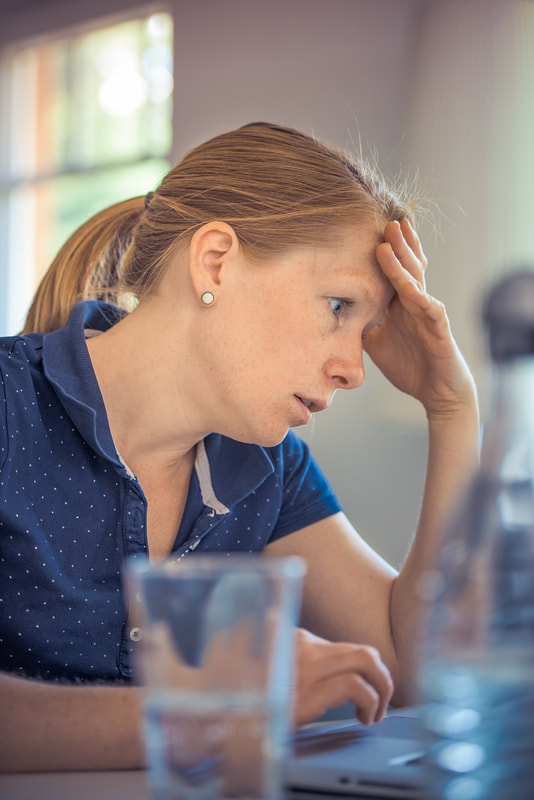How to Relieve, Manage, and Overcome StressStress is everywhere these days. So how to you overcome it? Try these key steps and strategies for understanding and reduce stress in your life.
*This page may include affiliate links; that means I earn from qualifying purchases of products.
You know the feeling. That tightness that keeps building in your body and mind that you can't find the release switch for. It's stress you're feeling! As stress hormones begin seeping into, then flooding your body, they prepare you for fight or flight, increasing your pulse and breathing rate, and pulling your body's attention away from everything else.
Chronic stress gets you stuck—neural pathways in your brain can become stronger, you can become super-sensitized to stress-inducing situations, and your body can get chock-full of stress hormones that it can't get rid of fast enough. What was intended by the body to serve as an occasional fight-or-flight mechanism has evolved into a daily fare of stress hormones which flood the bloodstream, causing tension and stress. Of course, this chronic stress is awful for our health, but to beat stress, we have to know what to do. (Take this stress quiz to learn more about your stress load.) Are You a Therapist, Coach, or Wellness Entrepreneur?
Grab Our Free eBook to Learn How to
|
2. Explore stress-reduction at homePerhaps you have a critical in-law, a jealous sister, a cheating mate, or screaming children who make way too many demands on you, causing your stress. Consider arranging share-time with other mothers, so you have some free time for yourself, or if needed, you may want to consider some child-care.
If your kids need some diversion, you and your kids can take your pet (or a neighbor’s pet) for a walk or sign your kids up for a neighborhood project, camp, or art class. If your spouse is creating stress for you, ask yourself: Is he/she over-worked and taking it out on you as the closest person who won’t get him/her fired, or is there an underlying relationship issue that needs to be resolved? |
3. Explore mental stress-reduction
If taking a thorough look at what’s causing your anxiety and its resulting stress doesn’t come up with any answers, what should you do? One approach is to take an honest look at your beliefs, values, and perspectives on life. Try to be more cooperative, compassionate, considerate of others, friendly, good-natured, and positive. We are less stressed when we are relatively open and flexible, rather than uptight. And we are definitely less stressed when we are happy or having fun!
4. Explore healthy approaches to stress reduction
People tend to handle stress better when they are healthy, so follow these rules for healthy living:
- Eat nutritious food in moderation. The “Mediterranean Diet’ is often extolled as the “healthiest” with its wide selection of fresh fruits and vegetables, olive oil, whole grains, seeds, nuts, and legumes, plus fish. It allows light servings of chicken, eggs, cheese, and yogurt, while red meat is allowed only rarely. This diet recommends that we stay away from excess sugars, sodas, processed foods, refined grains, processed meats, and trans-fat. Eat mindfully and slowly, chew well, avoid over-eating, and avoid toxins that can seep in your food.
- Exercise. Twenty minutes of aerobic exercise several times a week is recommended. Moderate exercise gives the muscles an outlet for stress and can help move through the stress cycle. But if that’s unrealistic for you, you would likely benefit from a daily walk. It’s even better when you walk in nature, which is calming and healing.
- Get enough sleep. Generally, 7-8 hours of sleep nightly is recommended, but this will vary by age, gender, intensity of physical exertion, and habit. Listen to your body: if you're tired, then sleep.
- Take breaks from tech. Today, with the omnipotence of the digital world, where almost everybody has a cell phone, and most are mesmerized by the internet, we should be aware of digital overload and screen fatigue, which can cause eye-strain, headaches, and even reduced well-being. (For more, see my book Outsmart Your Smartphone.)
- Socialize. With so many people glued to their computers and cell phones all day long and then watching TV, news, or movies into the evening as well, our once interactive communities are suffering today from a new form of isolation. Most jobs include some socializing with others, whether clients or co-workers, but more and more people are finding themselves isolated from others as they work at home all alone. Loneliness is reaching epidemic proportions among young and old alike. So remember to reach out to friends and family, because sharing our lives with others is an important part of a healthy lifestyle.
5. Explore relaxation techniques for stress reduction
- Taking several long, deep breaths is one of the quickest ways to shed stress, and it can be done anywhere.
- Consciously tighten and then loosen different muscle groups while sitting at your desk. Stress causes muscles to tighten, but by consciously working those same muscles, you can unlock their grip.
- Turn on some soothing music and really listen to it. Or have it as background music to calm the room where you are working or relaxing.
- Develop a meditation practice. If you don’t know where to begin, you can start by closing your eyes while taking some deep breaths. Slowly count your breaths on the exhale to help you quiet your restless mind. Keep bringing your focus back to your breath. Continue counting breaths up to 50, or for a set period of time, gradually lengthening your practice until you no longer need to count. Guided visualizations are helpful for reducing stress as well.
- Take a hot bath or soak in a hot tub. Water is soothing for most people, and hot water relaxes your muscles.
- Do something creative that you enjoy. Try sketching, singing, dancing, making jewelry, gardening, etc. Maybe you like to write. Journaling, whether organized or stream-of-consciousness, can be a helpful way to process your thoughts in order to release stress.
- Do something physical. Anything! Yell if it helps. Do chores around your house, or go somewhere. Make a plan and follow through with it.




